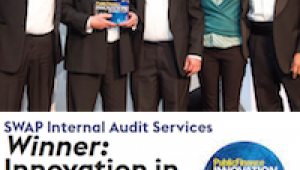15 June 2007
Informing the public is more than a duty, it's a challenge to make your audiences sit up and take notice. Wychavon council and the other winners of the Public Reporting and Accountability Awards have got what it takes. David Walker reports
Americans call them 'flaks' – frontline press officers such as former Tony Blair spokesman Alastair Campbell. The term derives in some convoluted way from the Second World War phrase 'taking the flak' – being subject to the enemy's gunfire. That is part of what Campbell did for Blair, and he will be telling the story in his soon-to-be-published diaries, minus (we're told) the swear words commonly used in Downing Street.
What Campbell did as well was 'spin' – put the best interpretation on his master's doings. Campbell, of course, was dealing daily with a hostile press and he never pretended to be anything but a partisan. But should public bodies that are not in the eye of the media storm pour gloss paint over their doings, accentuating the positive and downplaying the negative, even going as far as not mentioning the bad news?
The question niggled during this year's judging of the CIPFA/PricewaterhouseCoopers Public Reporting and Accountability Awards. 'Grandstanding' was a worry. These days most public bodies do a good job of telling the story of their finances and activities, on paper and through websites, and some are exemplary. But is there, we asked, a tendency sometimes to over-emphasise the good news and present reports as if they were part of a sales effort rather than a conscientious presentation of facts to give the public the means of judging the efficiency, effectiveness and probity of the organisation?
We wondered whether spinning is a sort of stepchild of regulation. If you know the Audit Commission or the National Audit Office or other inspectors are going to swoop and publicise your shortcomings, why not use the opportunity of an annual report to blow your own trumpet?
Yet the judging panel was presented with some merry tunes, played by organisations that think hard and imaginatively about how they communicate their affairs. Chair of the panel was John Speed, director of human resources, informatics and telecommunications at the European Court of Auditors. The judges included Rodger Hughes, UK managing partner at PricewaterhouseCoopers; Jessica Crowe, executive director, Centre for Public Scrutiny; Sally Bigwood, partner, Plain Figures; Caroline Gardner, deputy auditor general, Audit Scotland, and outgoing CIPFA president; Clive Caseley, associate director, Verve Communications; and Alison Hopkins, senior policy advocate, National Consumer Council.
In the first category – local organisations with a turnover of less than £50m a year – entries from district councils and social landlords predominated. Perhaps, reporting within defined boundaries, they were better able to convey a sense of talking to identifiable audiences. For example, Colchester Borough Homes, a social landlord formed after the transfer of council stock, is obliged to report not only to the people who most directly depend on it, the tenants, but also to a defined audience, made up of the inhabitants of the town, its local authority. Similarly, the other runner-up in this category, Rossendale Borough Council, wanted to tell a story about improvement and effort – 'you said, we did' – and tell it specifically to the residents of Rawtensall and the other communities that make up the district.
The sheer exuberance of its storytelling, especially online, made Wychavon District Council both the winner in this category and our pick for overall winner. Functionally, it doesn't do anything different from other districts, but puts out details of its services and how it spends public money with verve and enthusiasm. Fiona Narborough, who heads its communications team, says it is not a matter of spending more than other councils. Elected members – Wychavon is solidly Tory – are keen to put out readable messages.
But Narborough also acknowledges 'a personal passion to get across the tremendous range of products we offer', praising her team, plus the council's 'down-to-earth' accountants. 'We're spending public money – people should know what we do for that,' she says. 'And local government is often good at hiding products that make a difference to people every day.' Wychavon, which won the same awards categories last year, is being roped in by the Local Government Association to advise on its reporting.
Among local organisations with a turnover of more than £50m a year, Leeds City Council seemed to us – in its published reports and online presence – also to have a palpable self-confidence. If the basis of public relations is knowing what you want to tell an audience, then telling it well, Leeds shone. Leeds made explicit an assumption about the reading age of its audience, pitching it at 12, which should make materials universally intelligible. In a recent report on Revenue & Customs, the National Audit Office said the implicit reading age used by that body was 16–17, a level reached by only half the adult population.
All local authorities have similar material to put out, about charges, income and services, but some do seem – on the evidence before us – to put more effort into conceptualising both the message and its reception. Technical standards vary. Fife Council's materials were bold and brash. Glasgow Housing Association, the giant stock transfer landlord, wants to leave its tenants in no doubt about what it is and where it is going: here is the data. Renfrewshire Council's annual report was nicely attired and the authority won the judges' admiration for seeking to pay for its reports by securing advertising; the annual accounts, however, lacked a handy summary.
Audiences for messages are differentiated, and there is no point in pretending that the financial accounts of specialised public bodies are going to be of much interest to the public at large. What matters is that organisations have a communications strategy and know what they are doing. With the London Borough of Enfield, which was commended for including a glossary of accounting terms, judges felt materials were directed at the cognoscenti, the borough's partners and other stakeholders, rather than the public at large. There's nothing wrong with that, but it should be made explicit.
That doesn't exonerate them from communication responsibilities; it does enjoin them to be realistic about how they tell the tale. The Home-Grown Cereals Authority, winner in the category of national organisations with a turnover of less than £50m a year, is not a household name and even connoisseurs of quangos might not immediately place it as the body that supports the UK cereal and oilseeds industry in improving its competitiveness in domestic and overseas markets. Yet its annual report (to Parliament) is a model. It is brilliantly designed and the information is clearly presented even if, in its technical complexity, it would not win a Plain English award. For those who need to know – farmers, for example – it does the job.
The runner-up, Shared Interest, advances loans to 'fair traders', and while its straightforward accountability reporting is praiseworthy, we singled out its sustainability accounting for this year's special award.
In a year when judges worried about spinning, Defence Estates, winner of the category for national organisations with a turnover of £50m or more, secured our attention for the way it reported the bad news. A negative judgement from the National Audit Office on its stewardship that led to changes. The Ministry of Defence agency that handles forces' accommodation and training land – some of it recently opened up to ramblers – offers an expansive account of its work.
What appeared to us to distinguish the Pension Service and Metropolitan Housing Partnership, runners-up in this category, along with Defence Estates, was self-awareness, displaying an open and confident face to the public. Confident, yes, but not smug; they felt they had a story to tell and were prepared to put resources into it. Defence Estates' website is exemplary. If we had a caveat, it was over where to draw the line between accounting (providing material so an audience can make up its mind) and engagement (eliciting an audience's support).
The Highways Agency makes impressive efforts to engage, putting out maps and guides to truck stops, but that is not the same as accounting. The Liverpool Housing Trust scored higher on involving tenants than on reporting back on spending or its complex governance. (Other social landlords with group structures, in our view, found similar difficulties in explaining how they actually worked.)
It goes back to our misgivings about spinning. Public bodies are told to be competitive and to adopt commercial practices. Firms advertise, firms market themselves and rarely, unless forced, will they publicise their problems. A public body ought to share its problems with the public – that is part of the accountability package.
David Walker is editor of the Guardian's Public magazine and one of the judges of the CIPFA/PricewaterhouseCoopers Public Reporting and Accountability Awards. The prize ceremony was held in Bournemouth at the CIPFA annual conference on June 13
PFjun2007




















